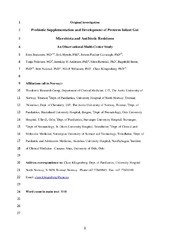Knowledge of antibiotics and antibiotic resistance among Norwegian pharmacy customers – a cross-sectional study
Permanent lenke
https://hdl.handle.net/10037/15174Dato
2019-01-15Type
Journal articleTidsskriftartikkel
Peer reviewed
Forfatter
Waaseth, Marit; Adan, Abdifatah; Røen, Ingrid L.; Eriksen, Karoline; Stanojevic, Tijana; Halvorsen, Kjell H.; Garcia, Beate Hennie; Holst, Lone; Ulshagen, Karen Marie; Blix, Hege Salvesen; Ariansen, Hilde Louise; Nordeng, Hedvig Marie EgelandSammendrag
Background: Antibiotic resistance is a global health threat. Public knowledge is considered a prerequisite for appropriate use of antibiotics and limited spread of antibiotic resistance. Our aim was to examine the level of knowledge of antibiotics and antibiotic resistance among Norwegian pharmacy customers, and to assess to which degree beliefs, attitudes and sociodemographic factors are associated with this knowledge.
Methods: A questionnaire based, cross-sectional study was conducted among pharmacy customers in three Norwegian cities. The questionnaire covered 1) knowledge of antibiotics (13 statements) and antibiotic resistance (10 statements), 2) the general beliefs about medicines questionnaire (BMQ general) (three subdomains, four statements each), 3) attitudes toward antibiotic use (four statements), and 4) sociodemographic factors, life style and health. High knowledge level was defined as > 66% of maximum score. Factors associated with knowledge of antibiotics and antibiotic resistance were investigated through univariate and multiple linear regression. Hierarchical model regression was used to estimate a population average knowledge score weighted for age, gender and level of education.
Results: Among 877 participants, 57% had high knowledge of antibiotics in general and 71% had high knowledge of antibiotic resistance. More than 90% knew that bacteria can become resistant against antibiotics and that unnecessary use of antibiotics can make them less effective. Simultaneously, more than 30% erroneously stated that antibiotics are effective against viruses, colds or influenza. Factors positively associated with antibiotic knowledge were health professional background, high education level, and a positive view on the value of medications in general. Male gender, a less restrictive attitude toward antibiotic use, and young age were negatively associated with antibiotic knowledge. The mean overall antibiotic knowledge score was relatively high (15.6 out of maximum 23 with estimated weighted population score at 14.8).
Conclusions: Despite a high level of knowledge of antibiotics and antibiotic resistance among Norwegian pharmacy customers, there are obvious knowledge gaps. We suggest that action is taken to increase the knowledge level, and particularly target people in vocational, male dominated occupations outside the health service, and primary/secondary school curricula.
Beskrivelse
Forlag
BMCSitering
Waaseth, M., Adan, A., Røen, I.L., Eriksen, K., Stanojevic, T., Halvorsen, K.H., ... Nordeng, H.M.E. (2019). Knowledge of antibiotics and antibiotic resistance among Norwegian pharmacy customers – a cross-sectional study. BMC Public Health, 19(1)66. https://doi.org/10.1186/s12889-019-6409-xMetadata
Vis full innførselSamlinger
Relaterte innførsler
Viser innførsler relatert til tittel, forfatter og emneord.
-
Antibiotic use and antibiotic resistance in dental practice
Ytreland, Kristian J. (Master thesis; Mastergradsoppgave, 2016-05-20)Antibiotic resistance in bacteria is an increasing problem in health care settings worldwide. After approximately 70 years of antibiotic use, the bacteria have developed mechanisms that let them survive antibiotic treatment. The use of antibiotics is an important factor in resistance development. Norwegian dentists prescribe approximately 5.3% of the total antibiotics consumed in the country. ... -
Antibiotic therapy in neonates and impact on gut microbiota and antibiotic resistance development: a systematic review
Fjalstad, Jon Widding; Esaiassen, Eirin; Juvet, Lene Kristine; van den Anker, John; Klingenberg, Claus Andreas (Journal article; Tidsskriftartikkel; Peer reviewed, 2017-11-22)<p><i>Objectives - </i>To systematically review the impact of antibiotic therapy in the neonatal period on changes in the gut microbiota and/or antibiotic resistance development. <p><i>Methods - </i>Data sources were PubMed, Embase, Medline and the Cochrane Database, supplemented by manual searches of reference lists. Randomized controlled trials (RCTs) and observational studies were included if ... -
Antibiotics and probiotics to neonates-Adverse effects, impact on gut microbiota and antibiotic resistome, and Bifidobacterium pathogenicity
Esaiassen, Eirin (Doctoral thesis; Doktorgradsavhandling, 2018-02-16)The main objective of this thesis was to systematically review potential side effects of antibiotic therapy in neonates and to study the gut microbiota composition of preterm infants receiving probiotic prophylaxis. This thesis includes two systemic reviews, a prospective longitudinal multi-centre trial investigating the gut microbiota in preterm infants receiving probiotics compared to preterm ...


 English
English norsk
norsk


